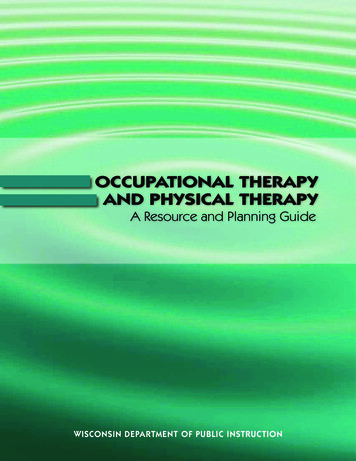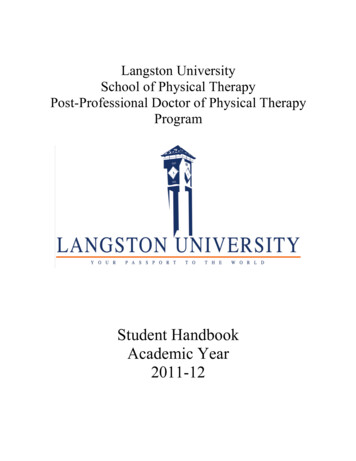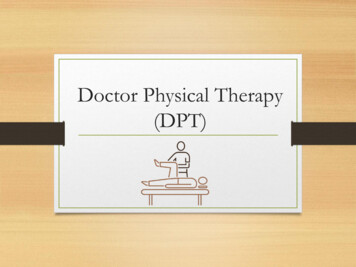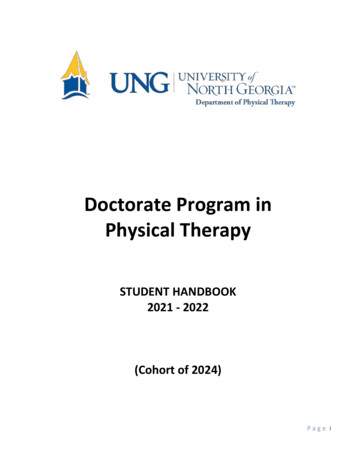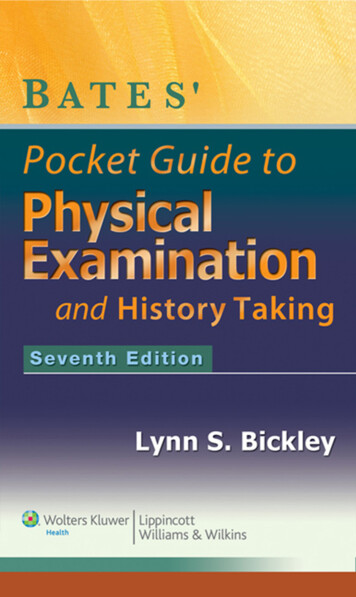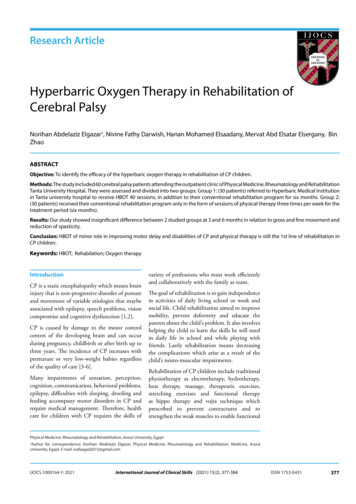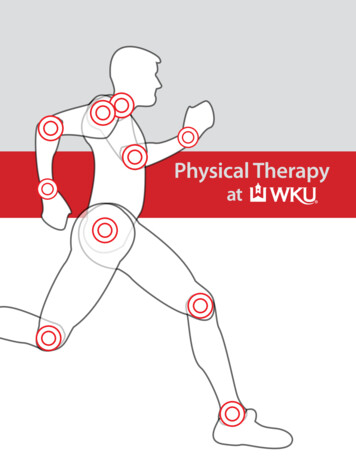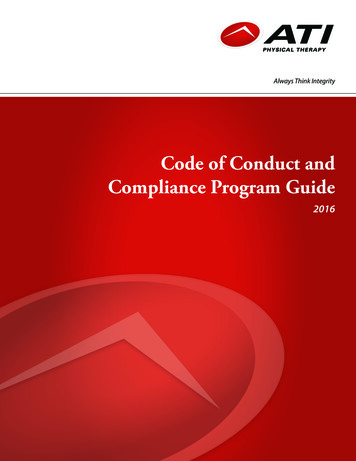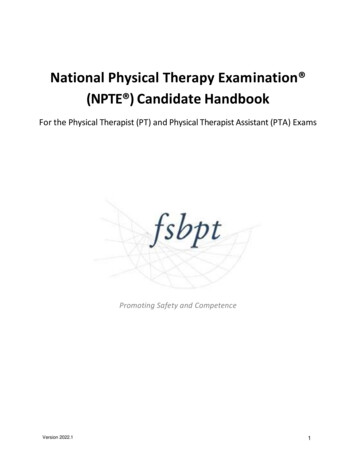
Transcription
National Physical Therapy Examination (NPTE ) Candidate HandbookFor the Physical Therapist (PT) and Physical Therapist Assistant (PTA) ExamsPromoting Safety and CompetenceVersion 2022.11
ContentsAbout the Federation of State Boards of Physical Therapy (FSBPT ) . 4Purpose of the NPTE Program . 4Exam Development . 4Section 2: Exam Integrity and Security . 5Protect your Reputation and Career . 5Exam Security on Test Day . 6Exam Security after Test Day . 6NPTE Security Agreement, General Terms of Use, and Arbitration Policy . 6Additional Security Information . 7Section 3: Eligibility Requirements . 7General Eligibility Requirements. 7Testing Limits . 7Section 4: Understanding the NPTE . 7Exam Administration . 7Exam Overview . 8Exam Scoring . 8Section 5: Preparing for the NPTE. 9Content Outline . 9Practice Exam and Assessment Tool . 9Section 6: Exam Registration and Scheduling . 9Your Journey Map . 9FSBPT Account Creation . 10Validating Graduation (CAPTE-Accredited Programs Only) . 10Registering for the NPTE . 10Exam Eligibility . 10Testing Accommodations. 11Authorization to Test (ATT) Letter . 11Scheduling your Exam . 11Section 7: Rescheduling, Withdrawing, and No-Shows . 12Rescheduling a Prometric Appointment . 12Canceling a Prometric Appointment . 12Version 2022.12
No-Shows . 13Section 8: Test Day . 13Arrival and Check-In . 13Testing Center Environment . 14Exam Navigation . 14Note-Taking . 14Breaks . 15Disruptions to Testing . 15Section 9: After Test Day. 15Receiving Your Results . 15Withheld Scores . 16Completing the Licensure Process . 16Score Transfers. 16Need to Test Again? . 16Performance Feedback Report . 17Section 10: Appeal Policy . 17Candidate Appeals . 17Jurisdiction Appeals . 17Contact Us . 17NPTE-PT Test Content Outline . 20NPTE-PTA Test Content Outline . 21Abbreviations . 22Sample Questions . 24Physical Therapist Examination . 24Physical Therapist Assistant Examination . 25Section 1: General InformationVersion 2022.13
About the Federation of State Boards of Physical Therapy (FSBPT )The mission of FSBPT is to protect the public by providing service and leadership that promote safe andcompetent physical therapy practice.FSBPT’s vision is that state licensing boards and FSBPT will achieve a high level of public protectionbased upon a strong foundation of laws and regulatory standards in physical therapy, effective tools andsystems to assess entry-level and continuing competence, and public and professional awareness ofresources for public protection.FSBPT develops, maintains, and administers the National Physical Therapy Examination (NPTE ) forphysical therapists (PTs) and physical therapist assistants (PTAs).Purpose of the NPTE ProgramThe PT and PTA exams are designed to assess a candidate’s basic entry-level competence aftergraduation from a PT or PTA program accredited by the Commission on Accreditation in PhysicalTherapy Education (CAPTE) or from an equivalent non-accredited program. The exams have two mainpurposes:1. To help ensure that only those individuals who have the requisite knowledge of physical therapyare licensed in the physical therapy field2. To help regulatory authorities evaluate candidates and provide standards that are comparablefrom jurisdiction to jurisdictionThe national exams are only one part of the evaluation process used by licensing authorities. In somejurisdictions, the national exam is supplemented by other means of assessing candidates' ability topractice physical therapy. For more information on each jurisdiction’s licensure requirements, see theLicensing Authorities Contact Information page on FSBPT’s website.Exam DevelopmentQuestions (also known as items) appearing on the NPTE are developed by volunteer item writers. Thesevolunteers are PTs and PTAs who represent a broad range of practice settings from across the country.Item writers attend workshops and receive instruction to enable them to write high-quality, job-relatedexamination items.Once items have been developed and submitted to FSBPT, the Exam Development Committee (EDC)reviews the items and determines if the item is entry-level, tests current content, and contains only onecorrect answer. The EDC also reviews entire test forms to ensure each item does not overlap content orcue the answer for other items on the examination form. These items will later become pre-testquestions on exams to determine fairness before appearing on the NPTE as actual scored items. Thereare fifty pretest items on each level of examination.Examinations are built based on an examination outline or blueprint. This outline identifies the contentareas that must be on the examination and the number of questions to be included from each contentVersion 2022.14
area. The outline is developed from a job analysis, which identifies the activities and tasks that comprisethe entry-level practice of physical therapy. The job analysis is based on survey data and expertjudgments.The involvement of a representative group of practicing physical therapists, physical therapist assistants,and other professionals during examination development ensures that the examinations are relevant tothe current practice of physical therapy. Additionally, staff and technical advisors work to maintain theexaminations and ensure compliance with established testing standards.Section 2: Exam Integrity and SecurityProtect your Reputation and CareerPassing the NPTE is a big step toward receiving your license to practice physical therapy.Understandably, you want to take advantage of all available resources when preparing for thisimportant examination. In the past, when you prepared for examinations in school, you may haveconsidered fellow students to be good resources for learning about questions that were on those tests.This should not be the case when preparing for the NPTE.The NPTE is the property of FSBPT and is protected by contract, trade secret, and federal copyright laws.It is a violation of these laws, and thus illegal, to share any information whatsoever about any NPTEquestion. In particular, sharing information about a question recalled from memory or asking someonewho has taken the NPTE to share such information is illegal.Soliciting recalled questions from candidates who have previously taken the exam is deeply unethical forseveral reasons. The first is obvious: you are expected to pass the test based on your own merit andwithout assistance. The members of the public who will entrust you with their well-being expect thatyou are a trustworthy and competent individual. By asking previous test takers to share questions withyou, you are committing an illegal act and are undermining the very purpose of the exam. Also, bysoliciting questions from previous test takers, you are encouraging others to commit illegal acts.FSBPT aggressively protects the integrity of the NPTE. This protection is important to safeguarding thepublic from persons who do not have the requisite knowledge of physical therapy and therefore are notqualified to practice physical therapy. Any person for whom FSBPT has a reasonable suspicion of sharingor soliciting information about any NPTE question may be prohibited from sitting for the NPTE until a fullinvestigation has determined that the person did not share or solicit such information.FSBPT has prosecuted and will continue to prosecute individuals who share or solicit others to share anyinformation whatsoever about any NPTE question. FSBPT will also report any incidents of candidatesrequesting questions or sharing questions to their licensing jurisdictions.Version 2022.15
The bottom line: Items from the NPTE are not to be shared or solicited for any reason, and candidateswho are determined to be guilty of soliciting or sharing questions will severely damage their chances ofever being licensed in any jurisdiction and are subject to prosecution and civil action.Exam Security on Test DayCandidates are required to provide two currently valid forms of identification to be able to sit for theexamination. Before entering the testing room, a Prometric staff member will take your photograph,scan you with a metal detector wand, and take a digital image of your fingerprint. You will need to give afingerprint scan each time you enter or leave the testing room. Additionally, Prometric records alltesting sessions on video.You can review Prometric’s Testing Center Regulations and view a video outlining what to expect on testday on Prometric’s website, www.prometric.com.If you give or receive assistance during the examination or if you violate any other security policy, youmay be required to stop testing immediately and leave the room. Your examination will not be scored.Prometric and FSBPT monitor all candidates and will statistically analyze scores for the purposes ofdetecting and verifying cheating. If FSBPT determines that your score is unable to be validated due to anunlikely response pattern, we will cancel your score and notify your licensing authority.Exam Security after Test DayFSBPT conducts additional validation and screening analyses following testing. In some cases,examination records are selected for additional validation analyses. Reasons we may hold scoresinclude: A mismatch between registration data and data received from Prometric,Response patterns that suggest a very narrow range of studying,An incident at a test center that requires investigation,The score is very low (near guessing),Very large score gains.Candidates whose examinations are held for additional validation will be contacted through email byFSBPT staff. Candidates will be required to provide additional information about how they prepared forthe NPTE. FSBPT will not release these candidates’ scores until they complete this additionalinvestigation or if the candidates provide inaccurate information. Candidates who do not complete theinvestigation within sixty days of testing are subject to having their scores canceled.NPTE Security Agreement, General Terms of Use, and Arbitration PolicyFor purposes of examination security, each candidates who wishes to take the NPTE is required to enterinto an agreement as part of the registration and examination-taking process. The full NPTE SecurityAgreement, General Terms of Use, and Arbitration Policy can be found dates/NPTE-Security-Agreement.Version 2022.16
Additional Security InformationIf you have questions about examination security, or if you know of a person or people who haveviolated FSBPT’s exam security policies, it is your responsibility to email security@fsbpt.org.Section 3: Eligibility RequirementsGeneral Eligibility RequirementsIn order to sit for the NPTE, you must meet the following eligibility requirements:1. You must be at least eighteen years old.2. You must have a degree appropriate for the exam level from a CAPTE-accredited institution.Candidates who did not graduate from a CAPTE-accredited institution should see the additionalrequirements outlined below.3. You cannot have an open security investigation or sanctions that have not been completed.Additional Requirements: Non-CAPTE Accredited InstitutionsLicensing authorities set additional eligibility requirements for candidates who graduated from a nonCAPTE institution. Make sure you have thoroughly reviewed your jurisdiction’s licensure requirementsbefore you register for the NPTE. You will not be able to schedule an appointment until your licensingauthority has reviewed your registration and made you eligible to sit for the NPTE.Testing LimitsThe following testing limits apply to all candidates taking the NPTE:1. You cannot test more than three consecutive times. If you have tested three consecutive times,you must skip the next exam date.2. You cannot test more than six times in your lifetime at either exam level. You may test up to sixtimes at both the PT and PTA level if you are otherwise qualified to test at both levels.3. You cannot test if you previously took the exam twice and received two very low scores, definedas any scaled score below 400.Section 4: Understanding the NPTEExam AdministrationThe PT and PTA exams are computer-based and administered at Prometric testing centers throughoutthe United States. Exams are administered on set dates four times per year in January, April, July, andOctober. Because of the time between exams, it is extremely important to carefully review and fullyunderstand the registration deadlines associated with an exam date, as any candidate who does notmeet a deadline must wait until the next scheduled exam date to test.Version 2022.17
Candidates may test at any Prometric testing center that is offering the NPTE, regardless of where theyare seeking licensure. For example, a candidate who is seeking licensure in Virginia may test at aPrometric testing center in Maryland; the scores will be sent to Virginia once they are released.Exam OverviewBoth the PT and PTA exams are administered in sections, with fifty multiple-choice questions in eachexam section. A scheduled fifteen-minute break is offered following the second section of both exams.Candidates may also take unscheduled breaks following the other sections of the exam, but time takenfor unscheduled breaks will be deducted from the overall exam time.The exam time for both the PT and PTA exams is presented as a block of overall exam time, whichcandidates may use as they wish as they complete the exam. The exam will terminate after the testingtime has elapsed.Exam LevelSectionsTotal QuestionsTesting TimeTotal Appointment Time*Physical Therapist (PT)52505 Hours5 Hours, 30 minutesPhysical TherapistAssistant (PTA)42004 Hours4 Hours, 30 minutes*Includes scheduled break time, pre-exam tutorial and post-exam survey.Exam ScoringThe NPTE is a multiple-choice exam with one correct answer for each question. Scores are determinedby the number of questions you answer correctly, with no penalty for choosing incorrectly. Thus it is inyour interest to answer every question, even if you are unsure of the answer.The NPTE uses sophisticated procedures to ensure test forms (versions) are equally difficult acrossadministrations. Scaled scores are an important part of making sure test scores are comparable.As forms of the NPTE may vary slightly in their level of difficulty, raw scores (the number of questions acandidate answers correctly) are converted to scaled scores. The scaled scores represent equivalentlevels of achievement regardless of the examination form taken, ensuring that scores on all forms of theexamination are comparable. The NPTE scaled score is a mathematical conversion of raw scores to ascale that ranges from 200 to 800. Because of the conversion, a score of 800 does not equal a perfectscore–it is only the highest score that FSBPT reports.All jurisdiction licensing authorities have adopted the same criterion-referenced passing standard for theNPTE. Although FSBPT reports scores ranging from 200 to 800, the NPTE is a pass/fail examination. Theexamination is not designed to distinguish between many levels of competence, only to distinguishwhether a candidate has at least the minimum level of competence required to practice as an entrylevel PT or PTA. The passing standard is a scaled score of 600; therefore, any score of 600 or higher is aVersion 2022.18
passing score, and any score below 600 is a failing score. The number of questions that have to beanswered correctly to achieve a score of 600 can change from form to form, but is generally within aone to two question range.If a form of the examination is slightly easier than the form on which the passing score was set, acandidate would have to answer more questions correctly to obtain a scale score of 600. If the form ofthe examination is slightly harder, a candidate would have to answer fewer questions correctly to passthe examination. This process ensures that we apply the same standard of difficulty regardless ofwhether the items are a little easier or a little harder than those on another form.Section 5: Preparing for the NPTEContent OutlineThe first and most crucial step to passing the NPTE is understanding and reviewing the contentpresented in the exam. Both the PT and PTA exams consist of objective, multiple-choice questionscovering the major areas of physical therapy. Abridged content outlines are included in Appendix A ofthis Handbook. Complete content outlines are posted on the FSBPT website.Practice Exam and Assessment ToolThe Practice Exam and Assessment Tool (PEAT) is a timed, computer-based, multiple-choice practiceexam presented in the same format as the NPTE that can help to identify your strengths and weaknessesprior to taking the actual exam. PEAT has several benefits: The same format and type of questions as the actual NPTEImmediate and automatic scoringA detailed performance report by content area and systemExplanations and rationales behind correct answersReferences to help you increase your knowledgeYour PEAT purchase includes two timed exams for your exam level (PT or PTA). Each set consists of aretired NPTE form and a practice form. The fee for PEAT is 99 for sixty days’ access.For more detailed information, please see the PEAT FAQs.Section 6: Exam Registration and SchedulingYour Journey MapThis section details the major milestones you will come across when you register to take the NPTE, butyour steps through the NPTE registration process may differ depending on your educational backgroundand jurisdiction. To help you navigate the process, FSBPT has created a tool that allows you to generateVersion 2022.19
your own, customized journey map based on your PT/PTA program and the state you want to practicein.FSBPT Account CreationIf you are graduating from a CAPTE-accredited program, your school will create your FSBPT profile foryou. You will receive an email confirming your account creation and requesting that you complete yourFSBPT profile. You must complete your profile before you will be able to access FSBPT exams andservices.If you graduated from a program that is not accredited by CAPTE, you will need to request that an FSBPTprofile be created on your behalf. To do so, visit https://pt.fsbpt.net/account/login and complete thesurvey linked on the right side of the page. If you do not have a Social Security Number, an Alternate IDnumber will be assigned to you after you complete the survey. Allow three business days for creation ofyour account.Validating Graduation (CAPTE-Accredited Programs Only)Your school will validate your graduation prior to your graduation date. You will not be able to registerfor the NPTE prior to having your graduation validated by your school. FSBPT allows candidates to sit forthe NPTE up to ninety days prior to their validated graduation date; however, jurisdictions may havemore restrictive policies. For more information, contact your jurisdiction directly. You can also consultFSBPT’s Licensure Reference Guide.Registering for the NPTERegister for the NPTE by logging in to your FSBPT profile and clicking the “NPTE” button in the green“Services” area of the screen. Carefully read the information on each screen before continuing. On thefinal screen, you will be asked to pay the 485 registration fee using a Visa, MasterCard, or Discovercredit or debit card.When registering for the NPTE, pay close attention to all applicable registration deadlines, which arefirm. You must register and pay the exam fee in full no later than 11:59 p.m. Eastern Time on the day ofthe registration deadline, or you will not be permitted to register for that exam. Deadlines are posted onthe FSBPT website.Exam EligibilityOnce you register for the NPTE, your jurisdiction will need to make you eligible for the exam. Thisprocess differs by state, so it is important to understand your jurisdiction’s policies and licensingrequirements. Jurisdictions often require a licensure application, supporting academic records, anapplication fee, or other documentation before they make their candidates eligible for the NPTE. It isyour responsibility to ensure that your jurisdiction has all necessary information to make you eligible forthe exam.Version 2022.110
You must be made eligible for the exam prior to the Jurisdiction Approval Deadline, which is seven daysafter the registration and payment deadline. If you are not made eligible by this deadline, yourregistration will be closed and your exam fee will be refunded minus a 50 processing fee. Deadlines areposted on the NPTE website.Important Note: If you have registered for the NPTE but have not yet been made eligible for the exam,contact your jurisdiction directly to determine what additional information is necessary to be madeeligible.Testing AccommodationsFSBPT offers reasonable testing accommodations under the Americans with Disabilities Act (ADA) tocandidates who have a recognized disability or impairment and who demonstrate that accommodationsare necessary to access the NPTE. To request testing accommodations, make sure to indicate that youhave a disability covered by the ADA when you register for the NPTE.The process for submitting an application for testing accommodations depends on where you areseeking licensure. For more information on applying for accommodations, see the FSBPT TestingAccommodations website.Authorization to Test (ATT) LetterOnce you have been made eligible for the NPTE and your request for accommodations has beenreviewed (if applicable), you will receive an Authorization to Test (ATT) letter via email. You can alsoaccess this letter within your FSBPT account by clicking on the “Status of my Request” link in the Servicesmenu.When you receive your ATT letter, take a few minutes to review it carefully. The ATT letter includesinstructions on how to schedule your testing appointment, the exam fee you will pay to Prometric, andyour name as it exists in Prometric’s registration system. Make sure your first and last names exactlymatch your name on the ID you will be presenting on test day. If the names do not match, update yourname in your FSBPT profile. If you have any doubts about the information contained in your ATT letter,contact FSBPT Exam Services well in advance of test day.Scheduling your ExamYou can schedule your exam appointment with Prometric online or over the phone. Both the websiteand phone number can be found on your ATT letter. Prometric’s exam fees are due when you scheduleyour appointment and are payable with a Visa or MasterCard or by direct debit to a checking account.Prometric testing centers fill up quickly, so it is critical to schedule as soon as possible after receivingyour ATT letter. If your preferred testing center is not available on your exam date, you may need toschedule your exam at a different location. You can continue to check Prometric’s real-time seatingavailability using their website in case a seat in a more convenient location becomes available, but thereis no guarantee this will be the case.Version 2022.111
In very rare instances, candidates may not be able to find a seat within 250 miles of their location. If youare unable to find a seat within this radius, please contact FSBPT Exam Services for additional assistance.If an Exam Services agent cannot find you a seat within this radius and you decide to withdraw fromyour exam, FSBPT will waive the standard processing fee. (See Section 7 for more i
graduation from a PT or PTA program accredited by the Commission on Accreditation in Physical Therapy Education (CAPTE) or from an equivalent non-accredited program. The exams have two main purposes: 1. To help ensure that only those individuals who have the requisite knowledge of physical therapy are l

